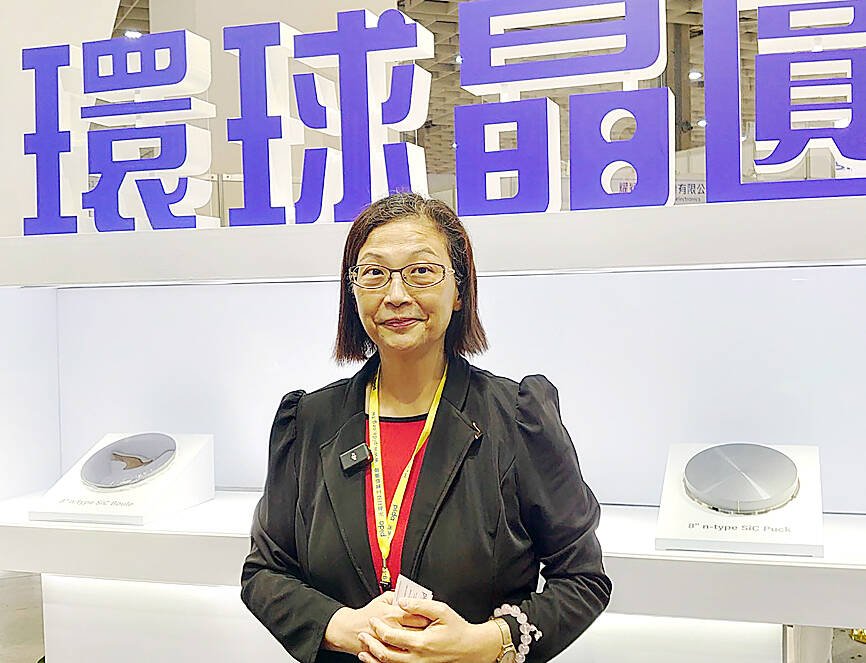GlobalWafers Co (環球晶圓), the world’s third-largest silicon wafer supplier, yesterday projected its revenue would fall by a high single-digit percentage this year, as customers undergo a lengthy inventory correction cycle.
That contrasted with the Hsinchu-based company’s earlier forecast of flat revenue growth this year.
“I think this year revenue would be lower than last year,” when revenue hit an all-time high, GlobalWafers chairwoman Doris Hsu (徐秀蘭) told a virtual investors’ conference.

Photo: CNA
Customers are digesting inventories at a “much slower-than-expected” pace, Hsu said. “That is where the problem is. That is why, up to now, raw wafer revenue pickup is not so obvious yet.”
GlobalWafers said it expects customers to reduce their inventory to much healthier levels by the end of this year, setting the scene for a recovery next year.
“Next year would be a healthy and positive year with good growth, not only for chip, memory and foundry companies, but also for silicon wafer companies,” Hsu said.
GlobalWafers has no plans to slow its capacity expansion at its new 12-inch fabs in the US, Italy and other locations, she said.
On Monday, the company said in a regulatory filing that it planned to buy land and buildings in Malaysia for 146 million ringgit (US$32.63 million) to cope with customer demand amid ongoing geopolitical tensions.
GlobalWafers’ revenue fell 16.7 percent annually to NT$30.41 billion (US$930.31 million) in the first half of this year.
Revenue in the second half would be flat compared with the first half, the company said.
Demand for 12-inch wafers has been strong lately and demand for 8-inch wafers is recovering, while there are no signs of further deterioration for 6-inch wafers, it said.
Net profit last quarter contracted 18.5 percent to NT$2.88 billion, from NT$3.53 billion the previous quarter, having declined 39.9 percent from NT$4.79 billion a year earlier. Last quarter’s profit was the lowest in the past eight quarters.
Earnings per share dropped to NT$6.02 last quarter from NT$8.1 a quarter earlier and NT$11 a year earlier.
Gross margin fell to 32.3 percent, the weakest level since the fourth quarter of 2017, after a cyberattack in June caused production disruptions at many of its fabs.

Semiconductor business between Taiwan and the US is a “win-win” model for both sides given the high level of complementarity, the government said yesterday responding to tariff threats from US President Donald Trump. Home to the world’s largest contract chipmaker, Taiwan Semiconductor Manufacturing Co (TSMC, 台積電), Taiwan is a key link in the global technology supply chain for companies such as Apple Inc and Nvidia Corp. Trump said on Monday he plans to impose tariffs on imported chips, pharmaceuticals and steel in an effort to get the producers to make them in the US. “Taiwan and the US semiconductor and other technology industries

A start-up in Mexico is trying to help get a handle on one coastal city’s plastic waste problem by converting it into gasoline, diesel and other fuels. With less than 10 percent of the world’s plastics being recycled, Petgas’ idea is that rather than letting discarded plastic become waste, it can become productive again as fuel. Petgas developed a machine in the port city of Boca del Rio that uses pyrolysis, a thermodynamic process that heats plastics in the absence of oxygen, breaking it down to produce gasoline, diesel, kerosene, paraffin and coke. Petgas chief technology officer Carlos Parraguirre Diaz said that in

SMALL AND EFFICIENT: The Chinese AI app’s initial success has spurred worries in the US that its tech giants’ massive AI spending needs re-evaluation, a market strategist said Chinese artificial intelligence (AI) start-up DeepSeek’s (深度求索) eponymous AI assistant rocketed to the top of Apple Inc’s iPhone download charts, stirring doubts in Silicon Valley about the strength of the US’ technological dominance. The app’s underlying AI model is widely seen as competitive with OpenAI and Meta Platforms Inc’s latest. Its claim that it cost much less to train and develop triggered share moves across Asia’s supply chain. Chinese tech firms linked to DeepSeek, such as Iflytek Co (科大訊飛), surged yesterday, while chipmaking tool makers like Advantest Corp slumped on the potential threat to demand for Nvidia Corp’s AI accelerators. US stock

SUBSIDIES: The nominee for commerce secretary indicated the Trump administration wants to put its stamp on the plan, but not unravel it entirely US President Donald Trump’s pick to lead the agency in charge of a US$52 billion semiconductor subsidy program declined to give it unqualified support, raising questions about the disbursement of funds to companies like Intel Corp and Taiwan Semiconductor Manufacturing Co (台積電). “I can’t say that I can honor something I haven’t read,” Howard Lutnick, Trump’s nominee for commerce secretary, said of the binding CHIPS and Science Act awards in a confirmation hearing on Wednesday. “To the extent monies have been disbursed, I would commit to rigorously enforcing documents that have been signed by those companies to make sure we get